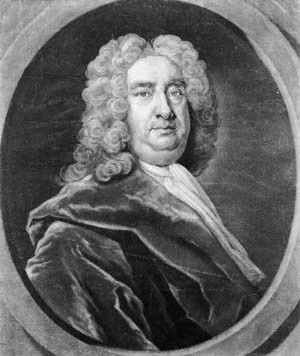George Cheyne (physician)

George Cheyne (1671 or 1672 – 12 April 1743) was a pioneering physician, mathematician, and writer of the early 18th century. He is best known for his contributions to medicine, particularly in the areas of dietetics and obesity, and for his philosophical works that bridged the gap between science and philosophy. Cheyne's innovative approaches to health, especially his emphasis on diet and the mind-body connection, were ahead of their time and have had a lasting impact on medical and nutritional advice.
Biography[edit]
George Cheyne was born in Scotland, either in 1671 or 1672. He studied medicine at the University of Edinburgh, where he was influenced by the early Enlightenment ideas permeating the institution. After completing his studies, Cheyne moved to London to practice medicine. Initially, he struggled with his health due to a sedentary lifestyle and poor diet, which led him to become morbidly obese. This personal health crisis spurred him to research and adopt a more health-conscious lifestyle, including a strict diet and regular exercise. His experiences and findings became the basis for his later works on health and nutrition.
Medical Career and Contributions[edit]
Throughout his career, Cheyne wrote extensively on various medical topics, but his most significant contributions were in the field of dietetics. He advocated for a vegetarian diet, moderate exercise, and the importance of mental well-being for physical health. His most famous works include The English Malady (1733), in which he explored the relationship between mental and physical health, and An Essay of Health and Long Life (1724), where he provided advice on diet and lifestyle for health and longevity.
Cheyne was also one of the first to recognize the dangers of obesity, linking it to various health issues such as heart disease and diabetes. His personal success in overcoming obesity through diet and exercise made his advice particularly compelling to his contemporaries.
Philosophical Works[edit]
In addition to his medical writings, Cheyne also engaged with philosophical questions, particularly those concerning the nature of the soul and its relationship to the body. He was influenced by the works of Isaac Newton and other contemporary philosophers. Cheyne's philosophical writings often intersected with his medical theories, as he believed that understanding the mind was crucial for treating the body.
Legacy[edit]
George Cheyne's work laid the groundwork for modern approaches to diet and health. His emphasis on a holistic approach to well-being, considering both mental and physical health, has been incorporated into contemporary medical and nutritional advice. Cheyne's innovative ideas about diet, exercise, and the mind-body connection continue to influence health and wellness philosophies today.
Selected Works[edit]
- An Essay of Health and Long Life (1724)
- The English Malady (1733)
See Also[edit]
Ad. Transform your life with W8MD's Budget GLP-1 injections from $49.99


W8MD offers a medical weight loss program to lose weight in Philadelphia. Our physician-supervised medical weight loss provides:
- Weight loss injections in NYC (generic and brand names):
- Zepbound / Mounjaro, Wegovy / Ozempic, Saxenda
- Most insurances accepted or discounted self-pay rates. We will obtain insurance prior authorizations if needed.
- Generic GLP1 weight loss injections from $49.99 for the starting dose of Semaglutide and $65.00 for Tirzepatide.
- Also offer prescription weight loss medications including Phentermine, Qsymia, Diethylpropion, Contrave etc.
NYC weight loss doctor appointmentsNYC weight loss doctor appointments
Start your NYC weight loss journey today at our NYC medical weight loss and Philadelphia medical weight loss clinics.
- Call 718-946-5500 to lose weight in NYC or for medical weight loss in Philadelphia 215-676-2334.
- Tags:NYC medical weight loss, Philadelphia lose weight Zepbound NYC, Budget GLP1 weight loss injections, Wegovy Philadelphia, Wegovy NYC, Philadelphia medical weight loss, Brookly weight loss and Wegovy NYC
|
WikiMD's Wellness Encyclopedia |
| Let Food Be Thy Medicine Medicine Thy Food - Hippocrates |
Medical Disclaimer: WikiMD is not a substitute for professional medical advice. The information on WikiMD is provided as an information resource only, may be incorrect, outdated or misleading, and is not to be used or relied on for any diagnostic or treatment purposes. Please consult your health care provider before making any healthcare decisions or for guidance about a specific medical condition. WikiMD expressly disclaims responsibility, and shall have no liability, for any damages, loss, injury, or liability whatsoever suffered as a result of your reliance on the information contained in this site. By visiting this site you agree to the foregoing terms and conditions, which may from time to time be changed or supplemented by WikiMD. If you do not agree to the foregoing terms and conditions, you should not enter or use this site. See full disclaimer.
Credits:Most images are courtesy of Wikimedia commons, and templates, categories Wikipedia, licensed under CC BY SA or similar.
Translate this page: - East Asian
中文,
日本,
한국어,
South Asian
हिन्दी,
தமிழ்,
తెలుగు,
Urdu,
ಕನ್ನಡ,
Southeast Asian
Indonesian,
Vietnamese,
Thai,
မြန်မာဘာသာ,
বাংলা
European
español,
Deutsch,
français,
Greek,
português do Brasil,
polski,
română,
русский,
Nederlands,
norsk,
svenska,
suomi,
Italian
Middle Eastern & African
عربى,
Turkish,
Persian,
Hebrew,
Afrikaans,
isiZulu,
Kiswahili,
Other
Bulgarian,
Hungarian,
Czech,
Swedish,
മലയാളം,
मराठी,
ਪੰਜਾਬੀ,
ગુજરાતી,
Portuguese,
Ukrainian
